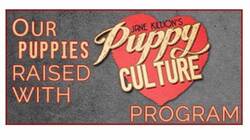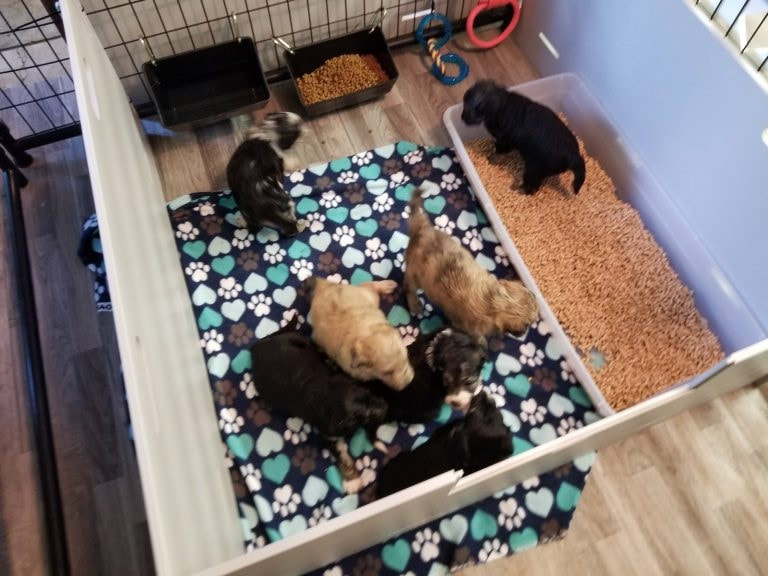
A puppy can be desensitized or sensitized while growing up. Most will probably be a little of both. A highly sensitized dog will be nervous and fearful. He has likely had no adverse situations and been quietly confined to his bubble or has been abruptly introduced to harsh stimuli with no safe place to go. Swamping a puppy with stimuli can also often makes a puppy and fearful and feel unsafe.
|
|
Early neurological stimulation (ENS) allows a pup to be slowly desensitized with small doses to stimuli. A desensitized dog will be resilience. He will bounce back from and fearful situation and be more easy going. Much of it has to do with genetic tendencies but a lot of it has to do with early stimulation and environment.
Here at Dent’s Doodles , we start using Puppy Culture for ENS at three days of age to introduce small doses of safe age appropriate emotional stimuli at a slow and easy pace. I encourage new owners to continue to follow the same program after they take the pup home. Culture is introducing small doses of stimuli - sometimes uncomfortably - from day three forward. We start just holding them gentle upside down, right side up, on the back, on a cold surface, and take a Q-tip between their toes. All for five seconds each. We do this for 2 weeks. |
We go from there to nail clipping and grooming, examination of teeth, ears, genitals etc.
We providing a variety of surfaces textures and obstacles to get used to. The idea is to teach them to deal with frustrating and uncertain situations.
We provide interactive and challenging toys to stimulate curiosity and mentally challenge them. We offer stimulations that encourage pups to climb, craw in tunnels, ring bells, and manipulate.
We pre-potty in a litter box making the transition of going outside easy. They are raise in a crate and use to being shut in for short periods of time. We introduce them to the leash by allowing them to drag it around, them work on tugging gently so they tolerate the feel.
The idea is not to totally train the pups but to prime them for training by desensitizing them to what might otherwise be uncomfortable situations. We get them ready for the new owners to continue in training.
Desensitization by introducing the pups to strange and potentially uncomfortable sights and sounds helps pups learn to recover from uncomfortable encounters in the future. A dropped object, slammed door, beard, hats, train noises etc help the pups learn to recover from startling situations.
Hiding food/treats to encourage pups to go around, over, under an obstacle to figure out how to get it helps pups with problem solving. We provide puzzles and larger obstacles in this training.
Recovery and problem solving might be the most helpful to prepare a pup for service training. Although, we cannot guarantee the service quality of a specific pup at the age they go home we believe this preliminary training will give the best possible success for future training in this or any area.
Puppy Culture also offers extending training which will go beyond the age in which the puppies leave our home. I would strongly advise new parents to continue the program with further socialization, stimulation, desentization, and mental challenges.
We providing a variety of surfaces textures and obstacles to get used to. The idea is to teach them to deal with frustrating and uncertain situations.
We provide interactive and challenging toys to stimulate curiosity and mentally challenge them. We offer stimulations that encourage pups to climb, craw in tunnels, ring bells, and manipulate.
We pre-potty in a litter box making the transition of going outside easy. They are raise in a crate and use to being shut in for short periods of time. We introduce them to the leash by allowing them to drag it around, them work on tugging gently so they tolerate the feel.
The idea is not to totally train the pups but to prime them for training by desensitizing them to what might otherwise be uncomfortable situations. We get them ready for the new owners to continue in training.
Desensitization by introducing the pups to strange and potentially uncomfortable sights and sounds helps pups learn to recover from uncomfortable encounters in the future. A dropped object, slammed door, beard, hats, train noises etc help the pups learn to recover from startling situations.
Hiding food/treats to encourage pups to go around, over, under an obstacle to figure out how to get it helps pups with problem solving. We provide puzzles and larger obstacles in this training.
Recovery and problem solving might be the most helpful to prepare a pup for service training. Although, we cannot guarantee the service quality of a specific pup at the age they go home we believe this preliminary training will give the best possible success for future training in this or any area.
Puppy Culture also offers extending training which will go beyond the age in which the puppies leave our home. I would strongly advise new parents to continue the program with further socialization, stimulation, desentization, and mental challenges.
